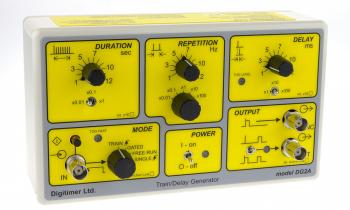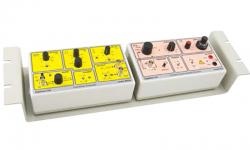FEATURES
- Easy TTL trigger source for Digitimer's stimulators
- Powered by batteries (single 9V, PP3)
- Four operational settings (Train, Gated, Free-run, Single)
- Delayed output for the research of the effective refractory period
The DG2A Train Delay Generator is a compact, free-standing instrument that can be used to define the Effective Refractory Period by applying a second, delayed pulse in addition to controlling regular repeated stimulation. When used as a frequency generator, the DG2A is extremely helpful.
Digitimer's DS2A Train Generators and Delay Generators can be used with DS3 and DS7A Isolated Stimulators that have their own pulse duration settings. The DG2 Trigger Generator's fundamental properties are still present, and they have been expanded to enable trains of pulses to be produced in response to input signals from other devices. The four operating modes for the DG2A Train/Delay Generator are described below:
Train: In the TRAIN mode, a standard button push or a TTL-compatible trigger received at the DG2A's IN socket is converted into a SYNC pulse train, with the repetition rate and train length specified by the REPETITION and DURATION settings. The DELAY knob enables the addition of a delayed pulse that can be detected at the OUT-1/OUT-2 output after each SYNC pulse.
Gated: When the input at the IN socket is TTL high, the DG2A will output a train of pulses at the SYNC socket while in GATED mode. This enables the operator to use an external device to GATE the train of pulses on and off. The REPETITION option controls the pulse repetition rate. In this mode, the DURATION control is inactive. The DELAY knob enables the addition of a delayed pulse that can be detected at the OUT-1/OUT-2 output after each SYNC pulse.
Free-run: While the device is turned ON, the DG2A will constantly output SYNC pulses at the rate set by the REPETITION setting. In this mode, the DURATION control is inactive. The DELAY knob enables the addition of a delayed pulse that can be detected at the OUT-1/OUT-2 output after each SYNC pulse.
Single: A single TTL compatible trigger received at the IN socket or push-button press is converted into a single SYNC pulse in SINGLE mode. In this mode, the REPETITION and DURATION settings are inactive. The DELAY knob enables the addition of a delayed pulse that can be detected at the OUT-1/OUT-2 output section of the DG2A after each SYNC pulse.
SPECIFICATIONS OF THE DG2A
The device consistently generates a pulse at SYNC to synchronize other equipment and a pulse that is delayed from SYNC via DELAY settings.
Modes
Control: Four position rotary switch.
Any cycle will be promptly terminated and remain in the Reset state for around one second upon movement of this control.
Should a cycle that is unusually long be accidentally chosen, this feature can be helpful.
Functions: SINGLE - Input signal triggers a single Output pulse.
FREE-RUN - Continuous Output pulses as set by REPETITION controls.
GATED - Input signal enables unit to produce pulses as set by REPETITION controls.
TRAIN - Input signal Triggers unit to produce pulses as set by REPETITION controls for the time as set by the DURATION controls.
Input
Connector: BNC socket
Levels: TTL high (>1.5V), TTL low (<0.8V)
Polarity: Active High (GATE/TRAIN) and Positive edge (SINGLE) or Active Low and Negative edge by Internal Jumper
Internal Jumper: Enable “Active Low” - allowing for an Input that is Low during its active phase.
The front panel provides a check-box ? for marking with a waterproof pen when enabled.
In Active Low an external contact closure can be used.
Push-button: Has same function as a valid input signal.
Indicator: “TOO FAST” Red LED that flashes if a Trigger is received whilst the unit is busy.
DURATION (Train)
Total range: 10 ms - 12 seconds in three overlapping ranges
Control: Single turn control marked 1 - 12s with intermediate integer panel marks
Accuracy: ±1% at '1' and '12' marks, ±5% at intermediate marks
Multiplier: x0.01 ; x0.1 ; x1
Internal Jumper: Enable “x10” - giving a 100 ms - 120 s total range.
The front panel provides a check-box ? for marking with a waterproof pen when enabled.
REPETITION (Frequency)
Total range: 0.01 - 1200 Hz in five overlapping ranges
Control: Single turn control marked 1 - 12Hz with intermediate integer panel marks
Accuracy: ±1% at '1' and '12' marks, ±5% at intermediate marks
Multiplier: x0.01 ; x0.1 ; x1 ; x10 ; x100
DELAY
Total range: 1 ms - 1200 ms in three overlapping ranges
Control: Single turn control marked 1 - 12 ms with intermediate integer panel marks
Accuracy: ±1% at '1' and '12' marks, ±5% at intermediate marks
Multiplier: x1 ; x10 ; x100
Internal Jumper: Enable “x10” - giving a 10 ms - 12 s total range.
The front panel provides a check-box ? for marking with a waterproof pen when enabled.
Indicator: “TOO LONG” Red LED that flashes if DELAY longer than can be produced for each pulse.
Outputs - SYNC
Connector: BNC socket
Signal: Positive going, 200µs pulse, TTL compatible pulse (5V amplitude).
Outputs - OUT
Connector: BNC socket
Signal: Positive going, 200µs pulse, TTL compatible pulse (5V amplitude).
Control: Selection of only the Delayed pulse (upwards) or both the Sync and Delayed pulses.
Indicator: Amber LED that flashes for each OUT output pulse.
Internal Jumper: Enable “Active Low” - giving an Output that is Low during its active phase.
The front panel provides a check-box ? for marking with a waterproof pen when enabled.
Power
Control: ON/OFF toggle. OFF is down.
Consumption: <2mA
Internal: PP3 - (IEC-6LR61) style. Alkaline preferred
Battery Life: Approximately 250 Hours with Ever Ready 6LF22 or Duracell MN1604
Dimensions
Size: 188 x 110 x 60 mm (w h d)
Weight: 490 grams with battery fitted
ACCESSORIES
Supplied
- Operator’s Manual
- One PP3 battery (fitted)
Recommended
- D185-TC3 BNC Cable
- D185-TC3-2m BNC Cable



